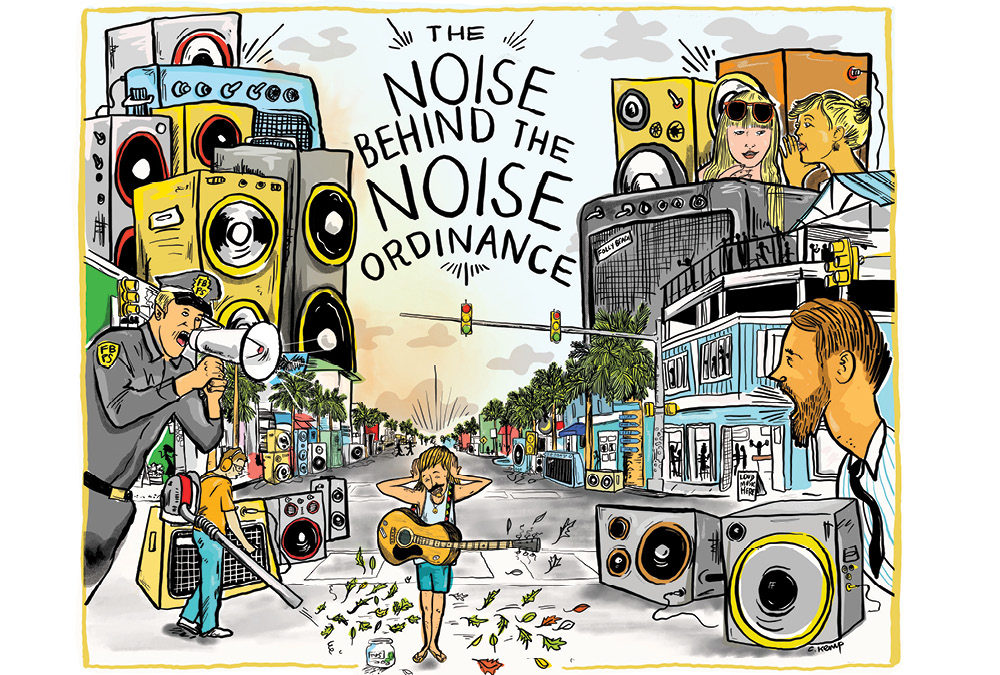After much debate, Folly scraps new noise ordinance
by Jenny Peterson | Contributing Writer
After nearly six months of debating, writing, and voting on a newer, stricter Folly noise ordinance, more than 50 people showed up at a special council meeting in late May called by Councilmember Eddie Ellis, two days after the final vote.
Ellis forced the special meeting because he wanted to reconsider his vote on the new ordinance, seemingly to change his “yes” to a “no.”
The ordinance had already passed a second and final reading.
The standing-room-only crowd, tightly packed in council chambers, eagerly awaited the purpose and outcome of this meeting.
Not many in attendance at the special meeting appeared to be in support of stricter noise rules for Folly, which included cutting off outdoor music at bars and restaurants at 10 p.m., an hour earlier than the previous 11 p.m. requirement on weekends.
The newly-passed ordinance also included an island-wide specific decibel level in an attempt to define what is considered too loud.
At 6 p.m., all council members were present … except for Ellis.
Chatter quickly spread through the room about why the council member who forced the special meeting wasn’t there. Other council members stated that they had tried to reach him on his cell phone but didn’t hear back.
Mayor Tim Goodwin even tried to adjourn the special meeting due to Ellis’ absence, but no other council members seconded the motion to adjourn.
Council members who were present voted on amendments to the recently-passed ordinance. The amendment to raise the decibel levels from 60 to 80 passed, while the amendment to keep outdoor music until 11 p.m. failed.
Finally, Ellis showed up, 12 minutes late, with no explanation. He then offered his own amendment, which sought to remove the words “outdoor music” from consideration completely. That amendment failed.
Whether it was the distraction from Ellis’ late arrival, the restlessness of the crowd, or the unusual circumstances of calling a special meeting to reconsider a vote, the council did not take a re-vote on the second-and-final reading at that meeting which was needed for the ordinance to officially pass.
By calling the meeting to reverse his decision, Ellis, in effect, made the previous “final reading” no longer count, said Spencer Wetmore, city administrator with the City of Folly Beach.
Procedurally, the final reading of the ordinance was placed back on the council’s agenda at its June 11 meeting for a re-vote. This time, it failed 4-3.
Those voting to scrap the new ordinance were council members Ellis, William Farley, Laurie Hull, and Mayor Tim Goodwin.
“Therefore, noise will continue to be governed by the old ordinance,” Wetmore said.
Ordinance Causes Commotion
The surprise ending came after a contentious – and at times, clunky – attempted update to the Folly Beach’s noise ordinance, which had been in effect since 2015. The debate caused confusion over decibel levels and even caused the creation of stickers which said, “Keep Folly Funky. Vote them out 2020.”
Business owners were concerned about the ordinance change right from the start.
The Folly Association of Business (FAB) released a statement in advance of the first vote, which read in part: “The Folly Beach Association of Business (FAB) is concerned that this change could restrict or remove their ability to provide entertainment.”
Elected officials also noted that new hours for outdoor music would impact the Moonlight Mixers, an ongoing event held by the Charleston County Parks and Recreation Commission (CCPRC) on the Folly Beach Pier. CCPRC announced that the Moonlight Mixer would be changed to 6-10 p.m. as a result of the ordinance passing (which it did … and then it didn’t).
On Monday, June 17, CCPRC released a statement: “Due to the rejection of the proposed Folly Beach noise ordinance, our Moonlight Mixers series at the Folly Beach Pier will now be held this summer as originally scheduled from 7-11 p.m.”
The issue split council members.
Councilmember Amy Ray said she was opposed to the time change for outdoor music to stop at 10 p.m.
She was in favor of establishing decibel levels, but said “no one was opposed to the time music was played, just that it was too loud.”
At every meeting to discuss and vote on the ordinance, various council members made multiple amendments, proposing changes to decibel levels and hours music could be played. Many observers said these changes were mucking up the ordinance.
“It passed (unanimously) the first reading, and if council would have left it alone, it would have passed and we could have tried it to see if it worked and could have always done a do-over,” Mayor Goodwin said. “At the very end, I did exactly what residents and business were asking — they didn’t want a new ordinance, they wanted to enforce the old noise ordinance already in place.”
Center Street Crack Down
Despite no change being made to the existing noise ordinance, public safety officers heard residents’ complaints about noise loud and clear.
Chief Andrew Gilreath, director of public safety, is using the experience to bring awareness to the existing noise ordinance and to hold business owners accountable.
Over the June 14 weekend, the chief personally issued two $500 noise-violation citations to Center Street businesses Snapper Jack’s and St. James Gate, after multiple warnings about turning music volumes lower and closing windows he said.
“We were advising them to close doors and windows and said, ‘Hey, it’s after 11. They got warnings, and the next night it was like we hadn’t even been there,” Gilreath said.
Over the weekend, the Washout and Crab Shack were also given warnings.
“Just because the new ordinance didn’t pass, we still have one in place. I spent that Friday night making sure it was being enforced,” he said. “A lot of people thought there was no noise ordinance. It’s more based on the opinion of the caller complaining and the officer on scene.”
That is set to change: During the study for the new noise ordinance, public safety officers purchased decibel readers. Chief Gilreath said that he will continue to train and equip officers with the readers.
“I like decibels because it gives officers a defined level, and I’m coming up with an internal policy and procedure for the staff to use decibels and define reasonableness with a definite number.”
Chief Gilreath said it will likely be in the decibel reading range of 80-85 that officers would consider too loud.
“I was in favor of giving police something to work with,” Mayor Goodwin said. “They learned all about decibels and readings and now their discretion can be decibels that they can enforce equally and fairly.”
Event Houses on the Radar
Gilreath said it’s a tough job to enforce noise at event houses during celebrations.
“Officers are not going to write a bride a ticket if her wedding is loud,” he said. “I understand the residents’ frustration when they are disturbed by the same house making noise — not the same people, but the same house getting warnings.”
The city’s short-term rental ordinance specifically states that houses that get multiple warnings for noise could lose their license to rent short-term.
“If they get multiple strikes, their license is in jeopardy. Those complaints go down, and we track it. Every week (the city staff) compiles how many strikes they get, and they are sent a letter to make sure the homeowners know their rentals are making noise,” Gilreath said.
Each short-term rental is required to provide guests the existing noise rules on Folly Beach, per the existing short-term rental ordinance.
Whether it’s noise from short-term rentals or from bars and restaurants, Gilreath said public safety officers are just trying to keep the peace.
“At the end of day, we just want to make sure the volume is good, and you don’t hear it two blocks away,” Gilreath said. “The current ordinance is on the city’s website; it’s not a secret. I hope bars don’t have to see us for anything other than a ‘hello,’ but if they don’t comply, there will be repercussions.”














